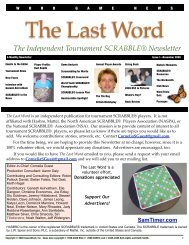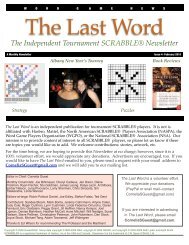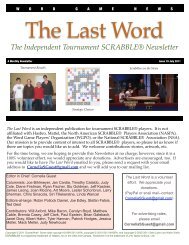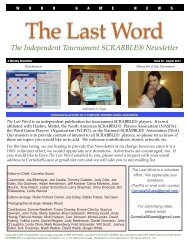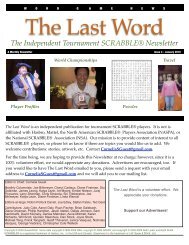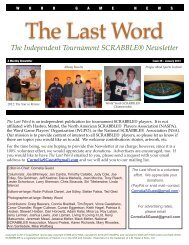SCRABBLE - The Last Word Newsletter
SCRABBLE - The Last Word Newsletter
SCRABBLE - The Last Word Newsletter
Create successful ePaper yourself
Turn your PDF publications into a flip-book with our unique Google optimized e-Paper software.
T H E T I L E B A GDear R2,This is, and has always been, a question that people routinely debate, and any answer I give is notgoing to be the be-all and end-all of what one should do (nor do I think it should be, because Icontinually ask this to myself). What I can do, however, is outline the key arguments as I personallysee them.<strong>The</strong> first argument is, of course, that if you take the points in the present, you will definitely have thatscore going into the next turns and thus are able to dictate the pace of the game. After all, a playerhaving a lead through the game is one of the key elements that will dictate the style of playthroughout the game as well as each party’s strategy on how to best manage his or her situation.<strong>The</strong> second argument is that while it is true that you can take points in the present, if you don’t makethe odds favorable that you can score well for the next turns, the score of the present might not beworth it. After all, it’s immaterial to score well for one turn if your opponent can easily catch up orovertake you, whilst you either are forced to exchange or play for small amounts of points as you tryto rebalance your rack. Pursuant to this opinion, one has to put at least some emphasis on futureconsiderations, and the best ways to do that are to keep your rack balanced, to give yourself theright leaves for the future, and in doing so shape your future prerogatives. Particularly in caseswhere a bingo or some other significant play is needed, the thought is that if you don’t save upproperly, you’ll almost definitely fail to achieve what you require.Both of these arguments have a lot of extra variables that often need to be considered when tryingto figure out what to do. How does the board look, from a positional perspective, and does thatperspective suit your objectives at the time? (Generally, when in the lead, you want to restrict theboard to keep your opponents from having chances to score, and when trailing you want to keepoptions open so that you have the chance to bingo or play other high-scoring plays when you getthe materials to do so.) What kinds of moves has your opponent been playing, and what kinds oflikely responses will he or she have to your move? Do you need to really start thinking outside thebox if, indeed, by general conventions, you would be generally thought to have lost the game? If youplay with a certain objective in mind, what chances do you have of obtaining that objective? And, ofcourse, other potential questions might come in mind when confronting a particular problem.In my opinion, there is no hard and fast rule about when to take points instead of leave. <strong>The</strong>re aregeneral principles that you, as a player, need to try to develop on your own, and adopt what worksand refine or abandon what doesn’t. Tools such as Quackle and Zyzzyva can be helpful in givingyou tools with which to improve your choices (i.e., building vocabulary) or providing new ideas inhow to look at a position (Quackle). But, as discussed in the previous question, you have to startlooking at why certain things might be viewed as right by other players, by computers, and so on;once you can explain these ideas to yourself, you can really start to figure out whether or not youagree with them and, in doing so, develop your own strategic framework from which to play. Forexample, the question involving the position above uses quite a few of these ideas, and it isidentifying these concepts that will continually help a player to make decisions in every game with achallenging turn.As I see it, help from outside is usually quite useful, and I think its greatest gift is in providing aseparate viewpoint that you can evaluate and use to build your own reasoning skills. It’s in this vein44







